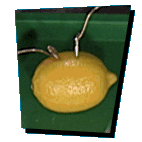 your results your results
Sent in by:
Kendra of MO
This clock is citrus-powered!

- 2 lemons
- 3 copper wires
- 2 large paper clips
- 2 pennies
- a digital clock
- scissors
- knife

- Check with a grown-up before you begin.
- First, attach one of the paperclips to a wire.
- Then attach a penny to a second wire.
- Attach another penny to one end of the third wire, and a paperclip to the other end.
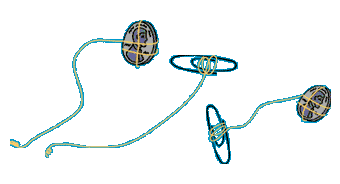
- Squeeze and roll two lemons to loosen the pulp inside.
- Make two small cuts in the skins of both lemons an inch or so apart.
- Put the paper clip that is attached to the wire and the penny into one of the cuts until you get to the juicy part of the lemon.
- Stick the penny into a hole in the other lemon.
- Put the other paper clip into the second hole of the lemon with the penny.
- Then put the last penny into the last open hole.
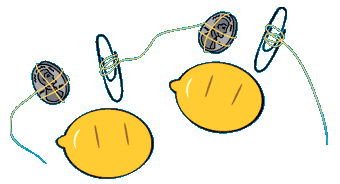
- Connect the free ends of the wires to the terminals of the digital clock.
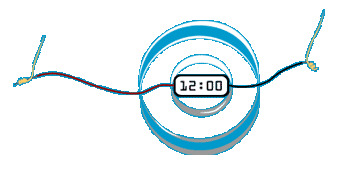
- Watch how the lemons make enough electricity to turn the clock on. If you've hooked everything up and the clock isn't running, try switching the wires.
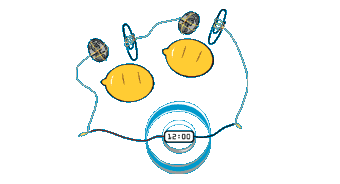
- Here's how this lemon battery works. There's a chemical reaction between the steel in the paper clip and the lemon juice. There's also a chemical reaction between the copper in the penny and the lemon juice. These two chemical reactions push electrons through the wires.
- Because the two metals are different, the electrons get pushed harder in one direction than the other. If the metals were the same, the push would be equal and no electrons would flow. The electrons flow in one direction around in a circle and then come back to the lemon battery. While they flow through the clock, they make it work. This flow is called electric current.
- This is hard to understand. So, if you need it explained to you again, be sure to talk to a parent or a teacher.
Now it's time to experiment. Do you think your lemon battery will still work if you change the lemons? Try cutting the lemons in half, or squeezing them and putting the wires in the lemon juice. Does your battery still work? Since lemon juice is an acid, think about how you can make batteries out of other acids, like orange juice or cola. Or see if your battery will work using a base, like soapy water. Choose one thing to change (that's the variable) and predict what you think will happen. Then test it and if you come up with some cool discoveries, send them to ZOOM.

Jenny, age 10 of Chicago, IL wrote:
it worked a second. it was awsome.
Etti and Rochel, age 13 of Los Angeles, CA wrote:
it worked!!! it was sooo cool! we had to do it for a science experiment for school and she was also amazed that it actually worked!
Joe, age 11 of NJ wrote:
it lit up the light.
Gavin, age 11 of Princeton, NJ wrote:
I tried this experiment 10 or 12 times, and it didn't work. But finally, after cutting the lemons into quarters, and using the display on a disassembled digital watch, it worked like magic! Now I'm going to use this as my science fair progect, since it turned out so good.
Sunny, age 9 of Seattle, WA wrote:
It worked so well. I did the potato and the bannana too. It stayed for 15 hours.
Arielle, age 10 of Washington, DC wrote:
the battery worked.
Mandy, age 10 of NY wrote:
It worked! It actually worked! I was so surprised that I could get it working so fast. I was thinking I might have to do it several ways or even more, so I was so shocked when I had it!
Zachary & Jager of St. Barbe, NL wrote:
Nothing!!! We tried it several ways. We changed the paperclips and the pennies to make it work, we made the wire thinner, we tried warming the lemons in the microwave to get the juices to flow better, and we also tried to light a small light bulb, and nothing worked. We also tried 4 lemons. were very dissapointed because we realy wanted it to work for our science fair project, and now we have to find something new to try.
Mehmet, age 10 of West Paterson, NJ wrote:
it worked with 4 lemons. it was so cool!
Kathryn, age 10 of Fayette, AL wrote:
It worked! This is a really cool experiment! I am doing it for my science project at school.
Gill, age 4 of Oakland, CA wrote:
it worked! it went on for over 2 weeks! amazing! what a way to save electricity! I was pretty happy that I did it for a science project!
Abby & Maggie of Clearfield, PA wrote:
it worked and we were so excited!!! because we are using it as a science project... but we found that u have to use three lemons.
Cailey, age 10 of Eastport, NY wrote:
my lemon clock has been working for about 3 days so far! I am so happy with what I did. I used aligator clips instead of connecting the striped wire to them. It made the progect a whole lot simpler. plus I had a lot of fun.
Josie & Bailey of New Albany, IN wrote:
it worked so well. My friend and I used it for our science fair project!!!
Gabriella, age 8 of Miami, FL wrote:
I tried with my dad but guess what? What? It did not work. I just knew why. The wire was supposed to be thin but it was thick. Now he's buyin' some... I bet it works now!!!
Amma, age 10 of San Jose, CO wrote:
It did not work for my science project so I started to write about the voltage and I won!
Lizette, age 12 of Mission, TX wrote:
is so cool it worck.
Faith, age 9 of New York wrote:
it kept my clock on for a few days.
Josh & Jessy, age 12 of New Glasgow wrote:
when me and my friend did the lemon clock and the potato clock and see which runs longer and we thought the lemon clock but the potato clock ran longer.
Anthony, age 11 of Montreal, QC wrote:
it worked when I was doing the experiment at my school. And I got good results.
Colleen, age 10 of Uhrichsville, OH wrote:
I used a lemon, a grapefruit and a potato. They all worked! I turned them over, made new slits and they worked again! You need very thin wire.
Jessy & Josh of Pictou County, NS wrote:
it works grate. it worked for over 2 days. I used it for my grade 6 science fair!
Angila, age 10 of Clearwater, FL wrote:
it didn't work. every thing I tried wouldn't work. My friend did it to and it didn't work. My whole class tried it didn't work.
ZOOM Fan, age 11 of Vancouver, WA wrote:
It did not work at all!!! I think next time I could use non coated wire.
Rayann & Marissa of Toronto, ON wrote:
Our lemon bateryy did not work, we were very disapointed by this.
Cameron, age 11 of E. St. Louis, IL wrote:
i did it 5 times and it did not work... ireversed it and it did not work
Daysha, age 12 of Kissimmee, FL wrote:
It didn't work. I don't know why but I used a paper clip then changed it to a nail and neither of them worked. But I had fun. See ya peeps.
|



